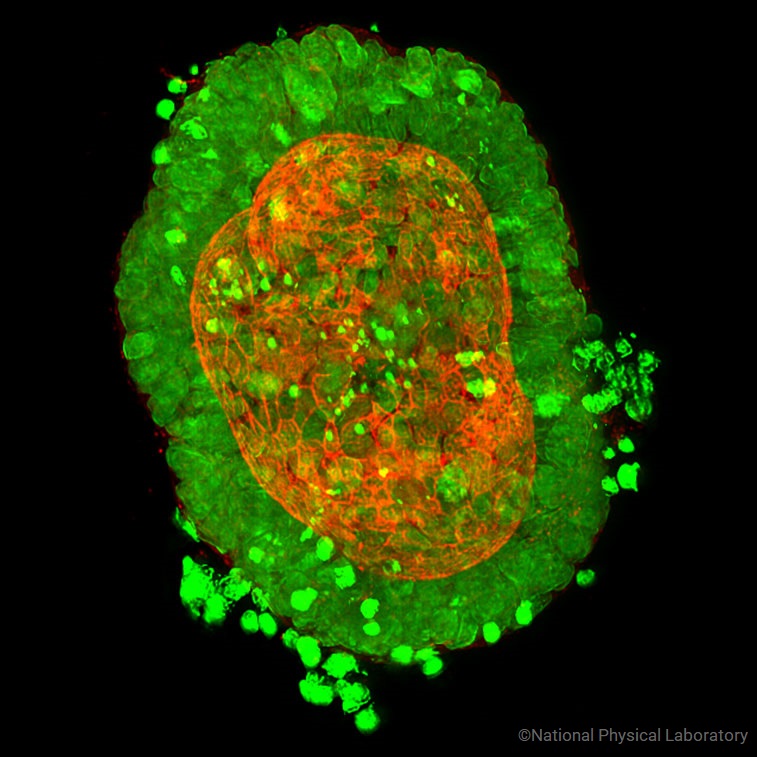Cardiff-based organoid company, Cellesce, peptide 3D scaffold specialists Manchester BIOGEL and complex protein manufacturer, Qkine, have been awarded Innovate UK Sustainable Innovation Funding to develop fully synthetic, chemically defined three-dimensional (3D) scaffolds that more accurately mimic the physiological environment in the human body and enable manufacture scale-up and improved reproducibility of patient-derived organoids.
Organoids are three-dimensional (3D) structures derived from stem cells that mimic mammalian organs. These have transformative potential as new platforms for faster drug discovery and better model systems for determining drug efficacy and toxicity, as well as pushing forwards basic biological understanding by more accurately replicating the responses seen in humans and reducing the need for animal use in research. However, existing methods for growing organoids rely predominantly on a 3D growth matrix extracted from mouse tumors to provide a supporting structure. This material is complex and poorly defined, leading to challenges with scale-up and limiting use in drug discovery platforms and other research applications.
This project seeks to address these issues by combining the existing technologies of Manchester BIOGEL’s tuneable peptide hydrogel scaffolds with Qkine’s optimized high-purity growth factors to build a new 3D cell culture scaffold that will mimic the natural environment of the body. Importantly, all the components will be chemically defined and animal product free, enabling greater experimental reproducibility. Working together with the leaders in patient-derived organoid scale-up, Cellesce, they will develop and tailor these new materials for scalable and reproducible organoid culture.
Commenting on the grant award, Professor Aline Miller, CEO of Manchester BIOGEL said:
I am very excited about this project – not only will we establish a new collaborative consortium, but we will also bring together our significant expertise to contribute to the development of an enabling platform technology with pressing scientific need, and with strong commercial potential.
A successful outcome from the collaboration will lead to the development of improved human cell-based models. This addresses key scientific challenges in the stem cell and drug discovery sector, reduces animal use in research, and strengthens UK life science manufacturing to provide a long-term sustainable return on investment for UK PLC.


Colorectal cancer organoids stained with Hoechst (blue/green) and Phalloidin (yellow/red). Images provided by Cellesce, copyright National Physical Laboratory.
Our collaborators:
Cellesce
Cellesce is an early-stage life sciences company with key disruptive technology that enables more effective cancer drug discovery. Cellesce’s technology enables the growth and expansion at scale of organoids derived directly from patient tissue biopsies (Patient-Derived Organoids, PDOs). PDOs grow from adult stem cells and Cellesce uses them as better cancer models that more faithfully replicate and predict patient clinical responses to drug treatment. Cellesce provides PDO models to the pharma and biotech industry to drive improved cancer drug discovery, more products to market and better treatments for patients. The company’s goal is to provide a wide range of PDOs at unrivalled scale using its patented bioprocess technology, to enable efficient discovery and development of cancer therapies.
www.cellesce.com
Manchester BIOGEL
Manchester BIOGEL is a global leader in the design and manufacture of synthetic self-assembling peptide hydrogels that provide a natural physiological extracellular matrix to support long term culture. Their biologically relevant hydrogels mimic the cell micro-environment and their stiffness and functionality can be modulated to simulate the natural environment of all human tissues. Manchester BIOGEL’s proprietary technology is 100% ethical, animal free and chemically defined. It opens up opportunities and offers clinically translatable solutions to meet current healthcare challenges within the growing fields of 3D cell culture, 3D bioprinting, tissue regeneration and drug discovery.